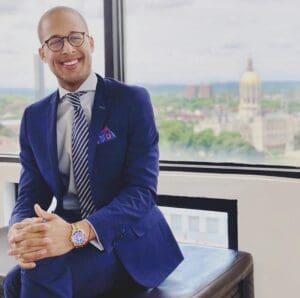This Is My Hartford is a new series from the MetroHartford Alliance where we connect with local business owners, community drivers, residents, and employees to find out how the Hartford Region has shaped them throughout their career, and what they have done to shape our city and region.
By Nan Price, Content Manager, MetroHartford Alliance
 Next in our series, Fitzgerald Council, CEO and Founder of Hartford-based Pathos Digital.
Next in our series, Fitzgerald Council, CEO and Founder of Hartford-based Pathos Digital.
WHY HARTFORD?
FITZGERALD COUNCIL: I grew up in Hartford. My grandparents lived in the Linden, an apartment building on Main Street that was built in 1891.
HOW HAS HARTFORD BECOME A PART OF WHO YOU ARE?
FITZGERALD: Hartford is a familiar place for me. I’ve always had great experiences here. When I first started my marketing business, it was only natural for me to locate it in Hartford because I was familiar with the area, I was familiar with the people, and I was familiar with the tone. It gave me the springboard to feel comfortable to start my first business here.
HOW HAVE YOU BECOME A PART OF HARTFORD?
FITZGERALD: I’ve become a part of Hartford by basically weaving my everyday life with Hartford. Everything I do is very revolved around the environment here. I use the city to help me facilitate relationships in business and my personal life. I use all the resources—the library, the restaurants, the coffee shops for meeting places.
WHAT MAKES HARTFORD UNIQUE?
FITZGERALD: Hartford is one of those places where, if you personally want to develop, Hartford is also developing. Most people who see that are people who see a lot of potential in Hartford—because there is a huge amount of potential here. People here also want to grow their businesses, their ideas, and their networks.
Hartford is also unique because of its history. It’s one of the only places in the East Coast and within New England that has such a powerful history. We have such beautiful architecture and landscapes. It’s kind of just sitting there latent, waiting for the next wave of innovators, entrepreneurs, entertainers, and artists to take advantage of all the city has to offer.
So, I think what makes it unique is that it’s not a place people have to go to make something out of. It already is something, it’s just is waiting for the right moment, the right people, and the right things to come together to help reach it’s potential.
HOW DO WE TELL THE STORY OF HARTFORD?
FITZGERALD: If we want to attract people to Hartford, we have to create the narrative behind Hartford. I think that’s what’s been missing. The narrative hasn’t been crafted correctly and it hasn’t been put out there to people. We have to create an emotional message about what Hartford has to offer and where Hartford came from that resonates with people.
The best way to attract people is create that narrative and make it a community, make it a culture, and provide that experience. Because at the end of the day, anybody who wants to visit some place or make it their home is looking for one thing only, which is experience. They want to experience something. That’s why people go to Paris, London, Boston, or New York. They go for experience. Hartford just needs to create that experience.
WHERE DO YOU SEE HARTFORD IN THE NEXT FEW YEARS?
FITZGERALD: Talking to my peers, seeing people engaged in all kinds of local activities—at restaurants, in parks, at events—and seeing people become involved in the city, I see a returning flow of energy and potential for people who want to invest in Hartford.
In the next three to five years, I see Hartford as being an exponentially growing destination for business and entertainment growth, especially growth in art and innovation. I also see a flow of innovation coming, because Hartford has the bones to support that.
A lot of other places are already solidified in their identity; they’re already solidified in what they can or cannot offer. Hartford is one of those places where it’s kind of a blank canvas. So, in the next few years, I really see it as becoming a model for urban and entrepreneurial growth and community and culture.
